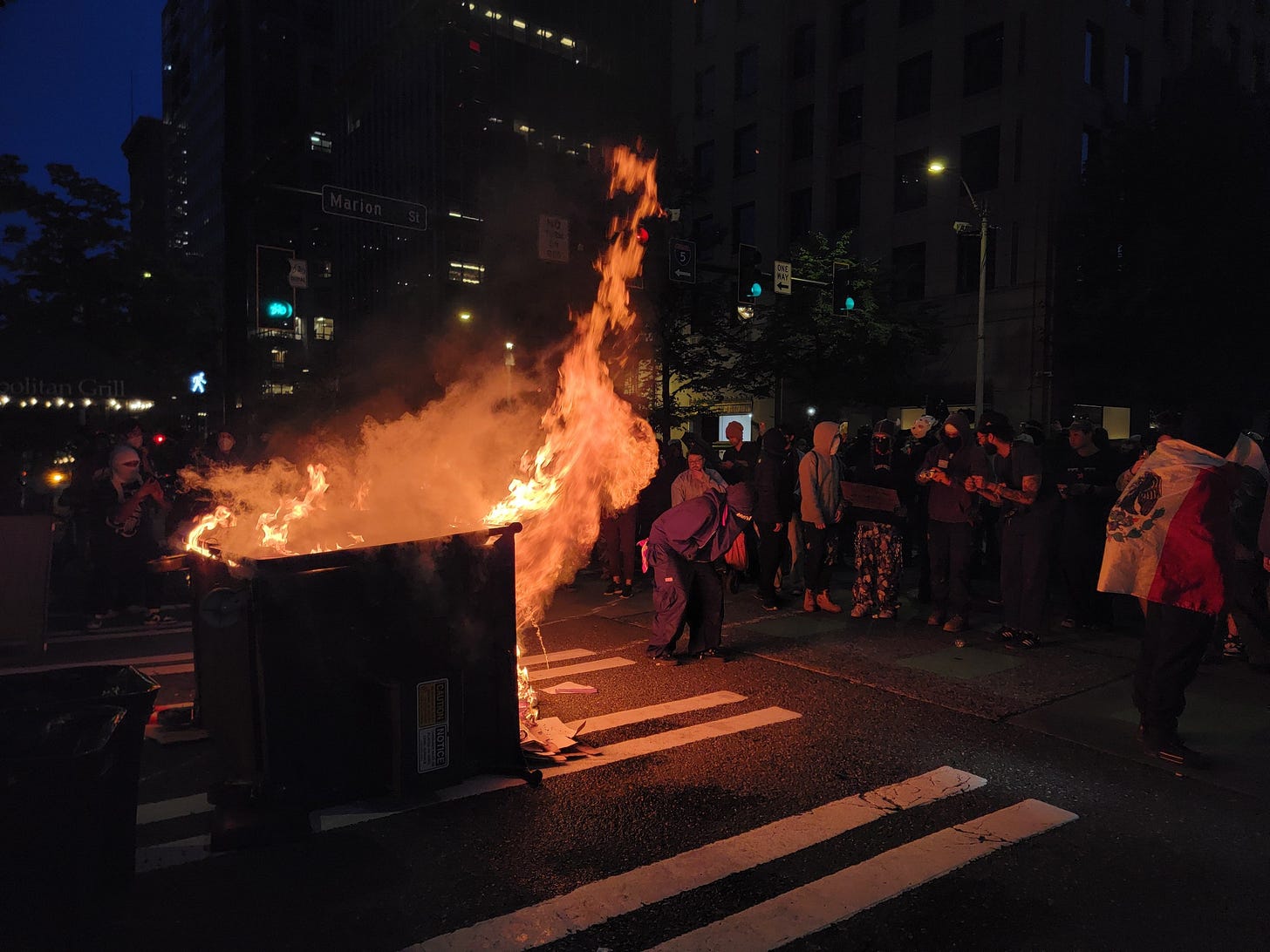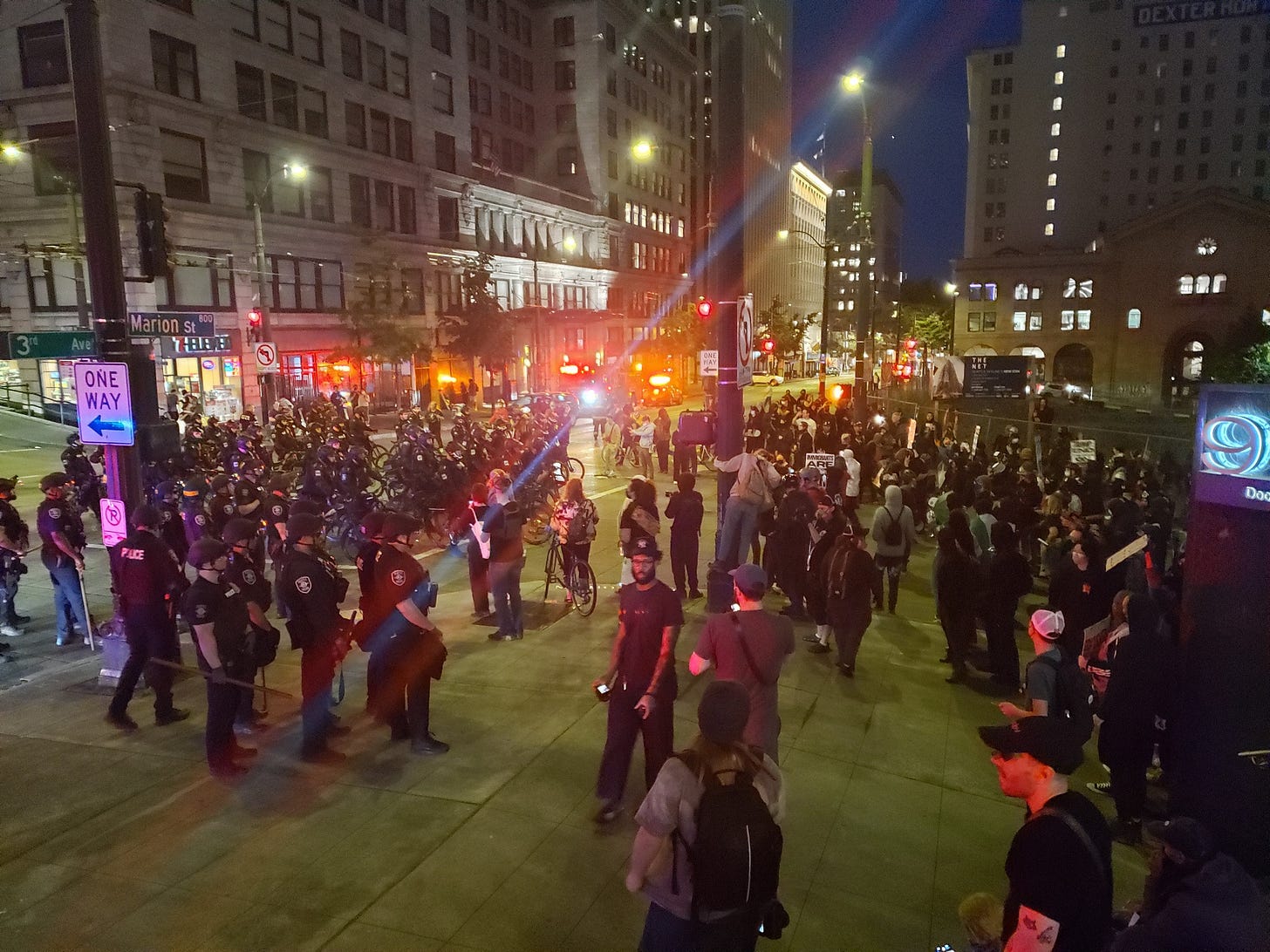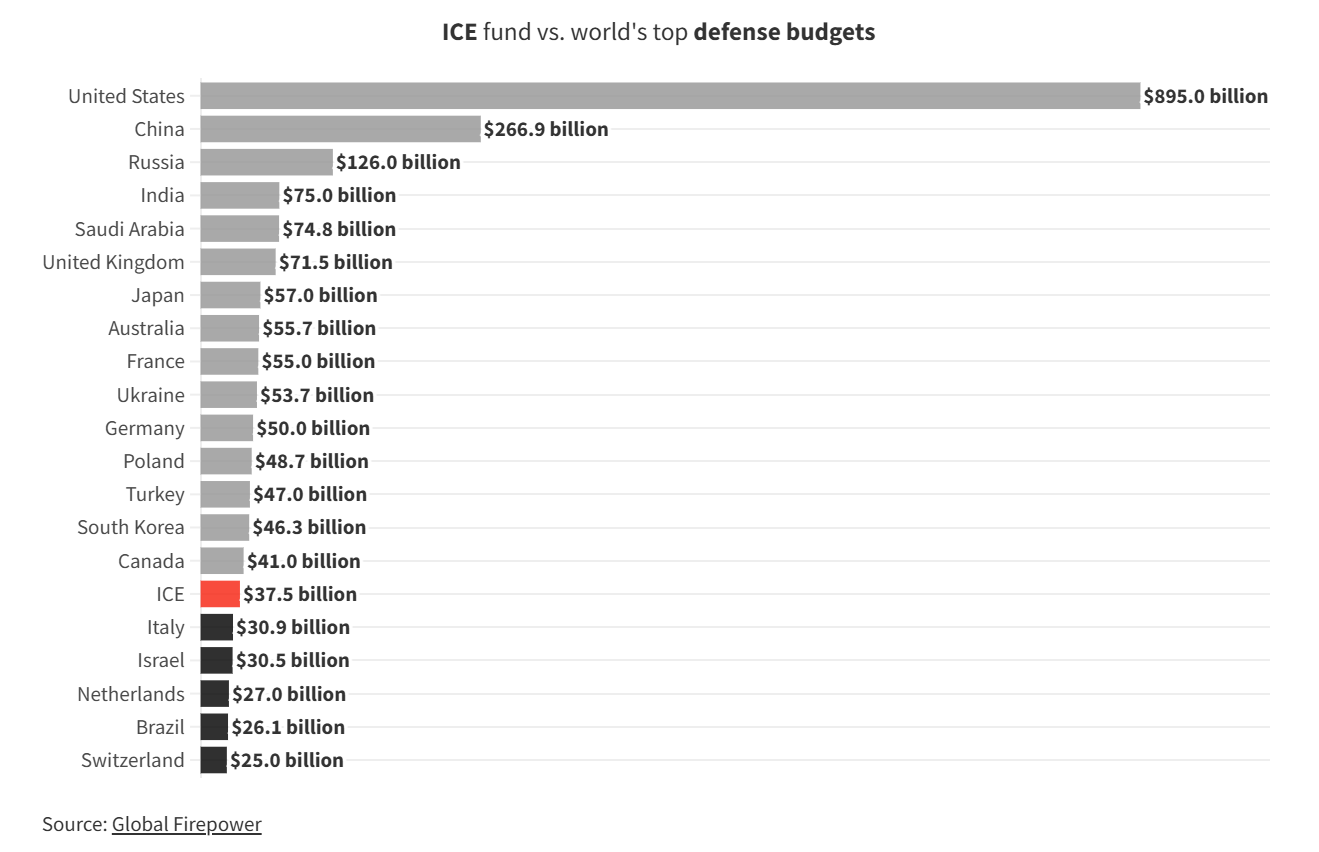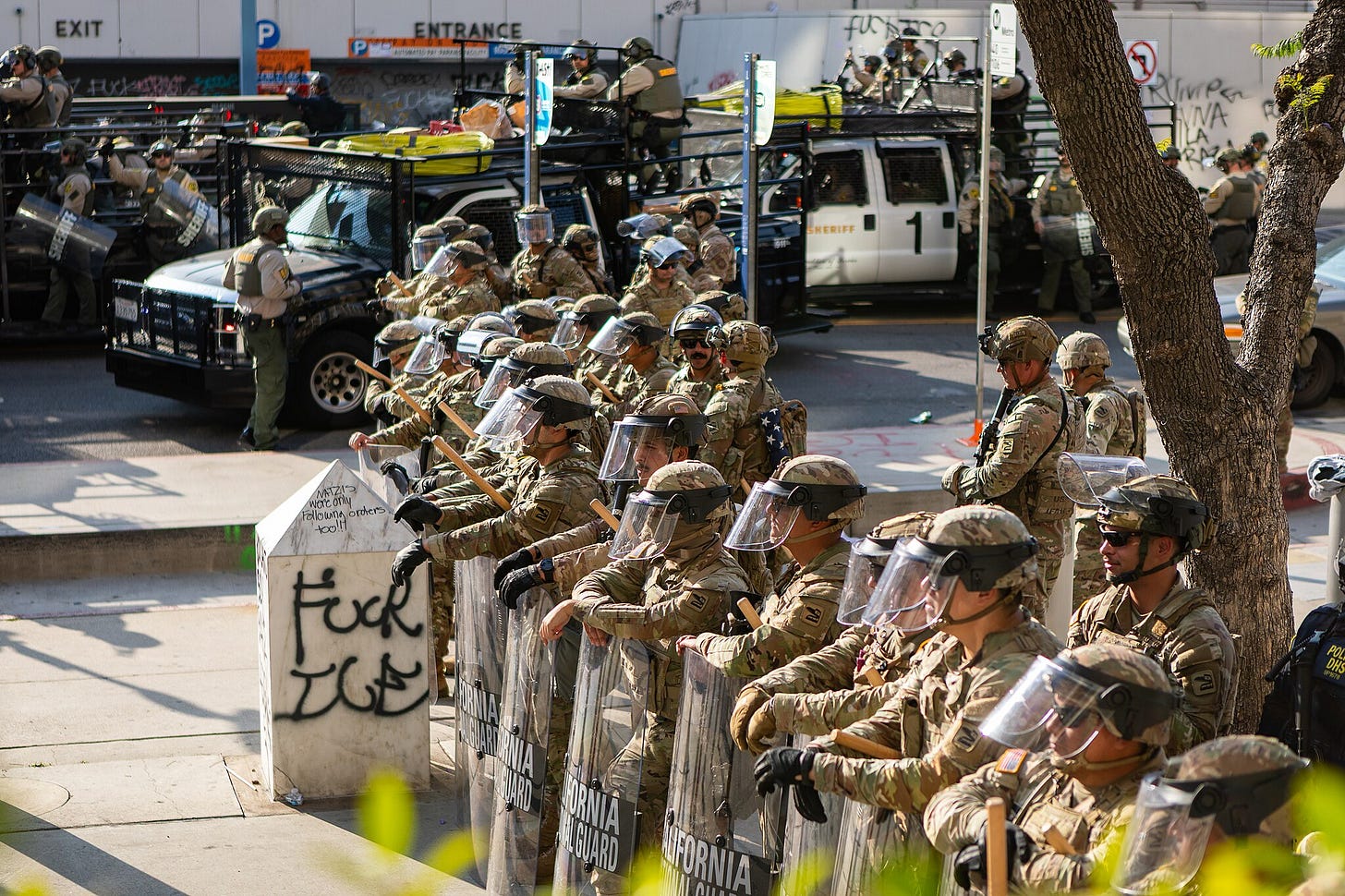America’s Not Alright
When do we eulogize the First American Republic and start planning for what comes next?
On the night of Wednesday, June 11, the full reality of America’s decay for the first time penetrated my general fatigue to pierce my emotional core.

The workday’s end had passed, and still I sat before my desk, hacking at my endless list of tasks, until I decided time had come for a break. I left and walked an oft-repeated circuit to a park a mile from my apartment that serves as a popular rallying spot for Seattle protests.
There, near a fountain on the park’s north end, I encountered the tail end of a march that had just set out for downtown to show their disgust for the terrors and traumas daily inflicted by ICE – that modern American Gestapo – and to demonstrate their solidarity with the people of Los Angeles as the Angelinos faced off first with ICE and the LAPD, then the National Guard and the Marine Corps.
Shortly after I ran into the seemingly spontaneous protest, a helicopter arrived on scene, a few hundred feet above, to monitor the march.
In another place or time, had I the security of a steady paycheck, I may have merged with that mass of the righteous and the unruly; instead, I rebounded off it and returned home to confront the work awaiting me.
But, as if to taunt me for my inaction, I unknowingly walked a path semi-parallel to the one planned by the activists until, at an intersection just blocks from my apartment, I found myself just yards ahead of the parade of protesters on their way to demonstrate in a part of downtown not far from where I live.
From 8 to 11 that night, as I plugged away at my keyboard, the steady drumbeat of a helicopter circling downtown filled my apartment, accompanied by the feint cries of the crowd and the rare, low thud of flashbang grenades and other crowd control measures.
In a sensory environment such as that, culled from the soundtrack to dystopia, no amount of stress-induced emotional fatigue could prevent me from accepting the truth of where America rests today: in collapse.

Little over three weeks later, on July 4, I wrote in my journal:
“249 years since the declaration we celebrate this day was signed to inaugurate America’s long experiment in democracy, that experiment has been brought to a firm and official conclusion.”
In the 23 days between the June 11 protest and Independence Day, millions flooded city streets in a one-day demonstration against America’s self-crowned king as the military paraded the nation’s capitol; a state politician and her husband were assassinated in Minnesota, and another legislative couple was shot that same evening by the same man; technocratic executives from companies focused on AI, robotics, and surveillance were sworn into the U.S. Army Reserves as lieutenant colonels; Israel attacked Iran, unprovoked, with America’s approval, and America later launched its own salvo; a candidate in New York’s mayoral race was arrested by ICE in the lead up to the city’s democratic primary, and after the socialist candidate Zohran Mamdani won that primary, he was threatened with arrest and deportation by the President and other elected officials; the federal government built, in a Florida swamp, over the course of just eight days, a new detention facility nicknamed “Alligator Alcatraz”; and an immense legislative package was passed and signed that both initiates the largest transfer of wealth from the poor to the rich in history and endows ICE with a budget greater than most militaries.

America’s democracy is, evidently, already in tatters. I’m not sure the country can survive three and a half more years of Trump. In fact, I know it can’t; it hasn’t survived six months. Whatever comes at the end of this term, whatever comes after Trump, it will be nothing like what existed for the two and a half centuries before the nation elected its first autocrat.
Given that, I am haunted by two questions.
At what point do we mourn and eulogize the First American Republic and start dreaming of, and scheming for, what comes next?
And how do we take this catastrophe, which has begun to dissolve everything we once were, and turn it into a chrysalis within which we can channel this hideous formless fascism into the beginning of a metamorphosis, a transformation that will allow America to remake itself into something even more complex and beautiful than before?
After all, there’s no turning back now. Whatever destination awaits us, we must cross a battlefield to reach it.

In his book End Times, computational historian Peter Turchin presents the research he has done to uncover the mechanics of collapse and understand why states fail. Based on his theories (which focus on wealth inequality) and the current realities of American political and social life, Turchin predicted that, no matter what anyone did, America would experience “an outbreak of serious violence during the 2020s.”
This has already begun, as we can see, and many are preparing for worse. No one can stop this, Turchin writes: “There’s too much inertia in our social system.”
With violence and unrest the inescapable near-future for our country, the question then becomes: What can this conflict accomplish?
All we can hope for is that when the violence ends, we will have learned how to construct a more equitable, egalitarian society that prevents the rich from siphoning wealth from the poor and that strives to provide as many as possible with the basic necessities of life: food, shelter, dignity.
That possibility seems distant.
Perhaps, in the interim however, we can hope for mass voter turnout during the 2026 mid-term elections that gives a new generation of Democrats that adhere to progressive, populist politics commanding majorities in Congress, so the legislative branch can impeach, convict, and unseat Trump while passing policies intended to benefit America’s poorest.
Regrettably, however, at this stage, deposing Trump would do little to arrest America’s descent since it would still leave us with Vance and the rest of the current administration intact. Impeachment could only save us from the caprices of an unstable, temperamental man.
At this point, I doubt America can be saved. I’m not sure it’s worth saving. The United State has entered a new age in its history, and should we withstand the remainder of the 2020s without civil war or secession, then we’ll nonetheless face the immense challenge of restoring order and rebuilding people’s trust in our institutions, at home and abroad.
I’d love to conclude these despondent ramblings with some prescription for action, some semblance of a solution that responds not just to the immediate crises before us as innocent people get rounded up and deported without cause or due process, but which also orients us toward long-term success in the battle for the future of the American Republic.
Unfortunately, I have nothing, and I’m skeptical of anyone who claims to know how we get out of this.
We certainly need some compass to guide us, but the path we find through the ruins of the First American Republic, I believe, will ultimately be discovered by groping and stumbling our way through smoke and ash, turning corners as we come to them, avoiding dead ends as we can, and holding our communities close along the way.



